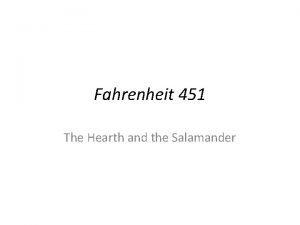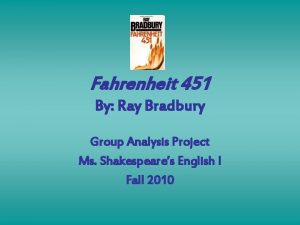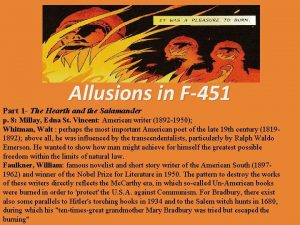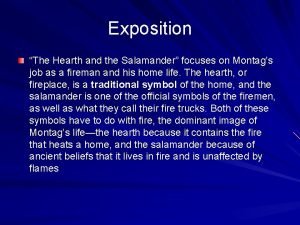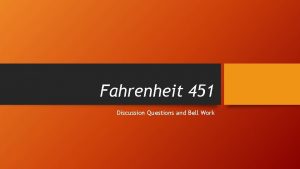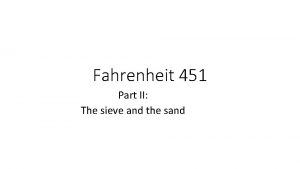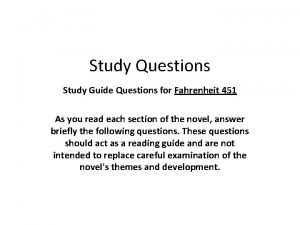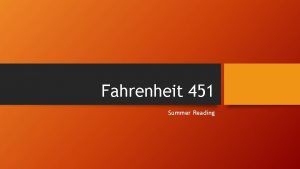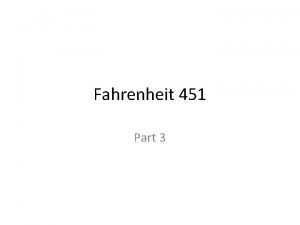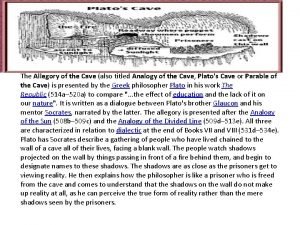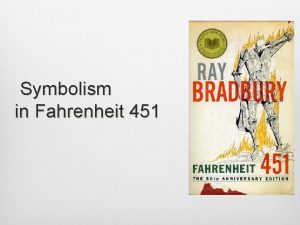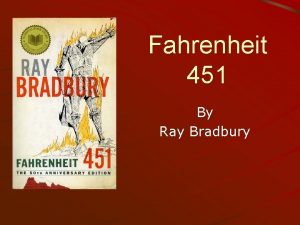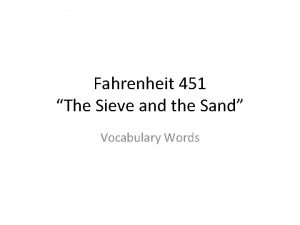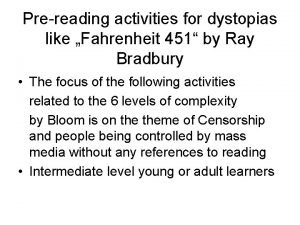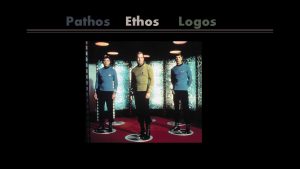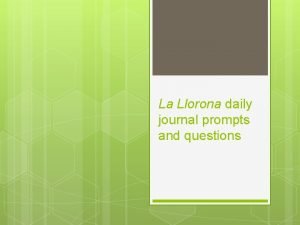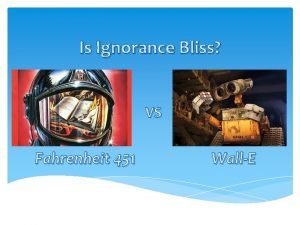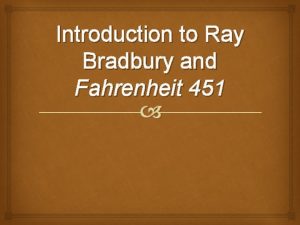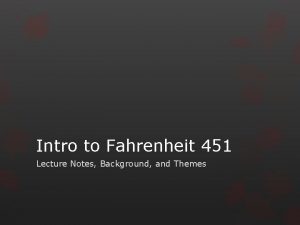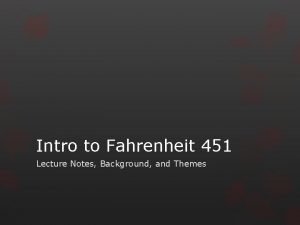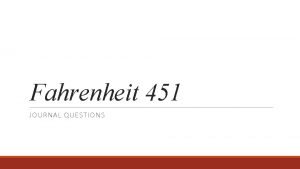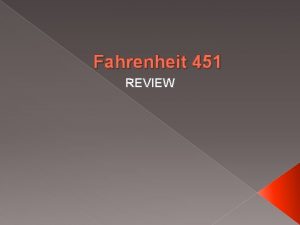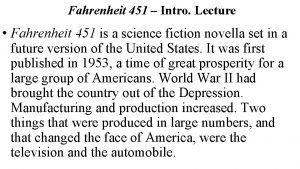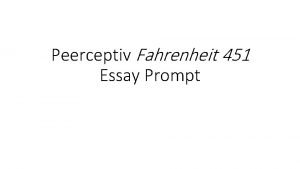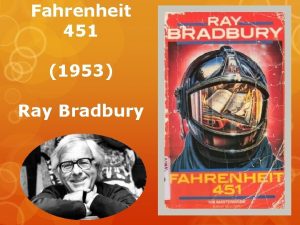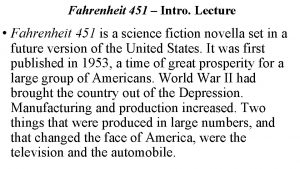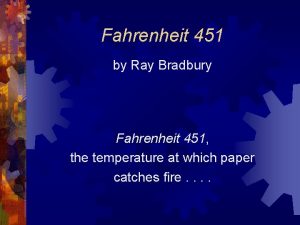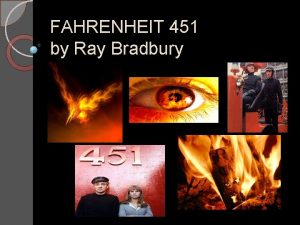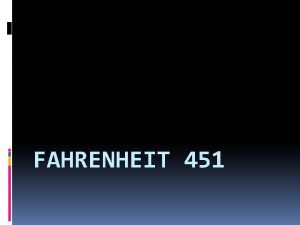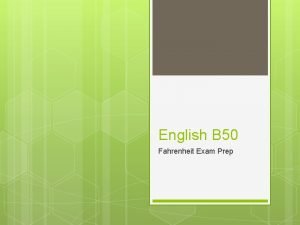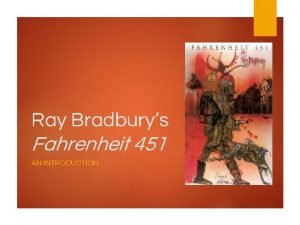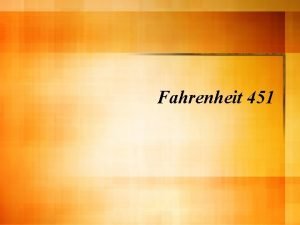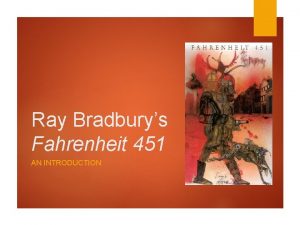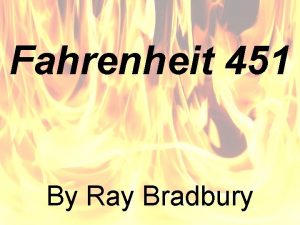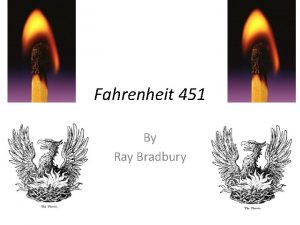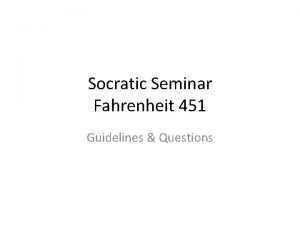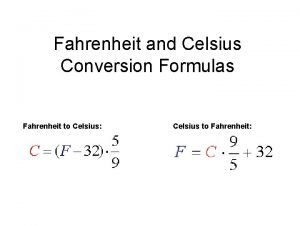Fahrenheit 451 The Hearth and the Salamander Questions
























- Slides: 24

Fahrenheit 451 “The Hearth and the Salamander” Questions

1. What is the significance of Montag seeing his reflection in Clarisse’s eyes? Cite textual evidence to support your response. (page 5) “He saw himself in her eyes, suspended in two shining drops of bright water, himself dark and tiny, in fine detail, the lines about his mouth, everything there, as if her eyes were two miraculous bits of violet amber that might capture and hold him intact. ”

2. Clarisse causes Montag to recall a childhood memory in which a wish was embedded. What was the significance of the memory and the wish? Cite textual evidence to support your response. (page 5) “One time, when he was a child, in a power failure, his mother had found and lit a last candle and there had been a brief hour of rediscovery, of such illumination that space lost its vast dimensions and drew comfortably around them, and they, mother and son, alone, transformed, hoping that the power might not come on again too soon. . . ”

3. What things do the Mc. Clellans do which cause them to be classified as peculiar? Cite textual evidence to support your response. (page 7)

4. What final question does Clarisse ask Montag on the night of their first encounter? Why is the question important to the plot? Cite textual evidence to support your response. (page 7)

5. What does the following observation made by Clarisse about Montag’s conversational mannerisms indicate about his personality? Cite textual evidence to support your response. "You laugh when I haven't been funny and you answer right off. You never stop to think what I've asked you. “

6. When Montag enters his home, he stares at the blank wall, but in memory sees Clarisse. What extended simile describes how he sees her? Cite textual evidence to support your response. (page 8)

7. Find two further similes Montag uses to describe Clarisse. Do the similes serve any purpose other than to characterize Clarisse? Cite textual evidence to support your response. (page 8)

8. Describe the bedroom which Montag enters. Whom does the setting characterize? Cite textual evidence in your response. (page 9)

9. At this point of realization (when Guy is in his bedroom), what happens to the smile on Montag’s face, and what is his answer to Clarisse’s question? Cite textual evidence in your response. (page 9)

10. What event occurs the same night from question #9 that provides Montag with an impression of the state of society? What is that impression? (page 11)

11. In contrast, what does Montag next hear and long for? Cite information from the text to support your answer. (pages 11 -12)

12. What test of love does Clarisse give Montag, and how does he respond to it? Cite textual evidence to support your response. (page 19)

13. Describe Clarisse’s personality. Cite textual evidence to support your response. (pages 19 -26)

14. What observations does Clarisse make about how Montag differs from other firemen? (pages 25 -28)

15. Describe the mechanical hound. Use evidence from the novel to support your response. (pages 21 -22)

16. What does antisocial mean? What does it mean in the society of Fahrenheit 451. To whom is the term applied? Use evidence from the text to support your answer. (pages 26 -27)

17. What does Clarisse say people talk about? (page 28) Find some examples of representative conversations throughout the book. (pages 15 -18 & 29)

18. During the card game at the fire station, what question does Montag ask? What does it contribute to the plot? (page 31)

19. What is the significance of the refrain repeated by the woman whose house was burned? What did it mean? What is its effect on Montag? (pages 33 -34)

20. What does Montag think his feelings would be if his wife were to die? Cite evidence from the novel to support your response.

21. What are Montag’s comments about the people in the walls? Cite evidence from the text to support your response.

22. What does Montag think about the old woman and all the books he has destroyed? Cite textual evidence to support your response. (page 47+)

23. Summarize Beatty’s explanation of how the need for firemen arose. Cite textual evidence to support your response. (pages 51 -57)
 The salamander in fahrenheit 451
The salamander in fahrenheit 451 Fahrenheit 451 final project ideas
Fahrenheit 451 final project ideas Allusions in part 1 of fahrenheit 451
Allusions in part 1 of fahrenheit 451 Beatty quotes fahrenheit 451
Beatty quotes fahrenheit 451 What does the hearth and the salamander mean
What does the hearth and the salamander mean The hearth and the salamander
The hearth and the salamander Fahrenheit 451
Fahrenheit 451 Cyrus daboo
Cyrus daboo How was beatty given montag hints
How was beatty given montag hints Fahrenheit 451 knowledge vs ignorance quotes
Fahrenheit 451 knowledge vs ignorance quotes Themes in fahrenheit 451 part 3
Themes in fahrenheit 451 part 3 Allegory of the cave fahrenheit 451
Allegory of the cave fahrenheit 451 Symbols and motifs in fahrenheit 451
Symbols and motifs in fahrenheit 451 Fahrenheit 451 themes
Fahrenheit 451 themes The sieve and the sand vocabulary
The sieve and the sand vocabulary Fire clown
Fire clown Fahrenheit 451 activities
Fahrenheit 451 activities Pathos
Pathos Literary criticism fahrenheit 451
Literary criticism fahrenheit 451 Fahrenheit 451 journal prompts
Fahrenheit 451 journal prompts Ignorance is bliss in fahrenheit 451
Ignorance is bliss in fahrenheit 451 Fahrenheit 451 genres
Fahrenheit 451 genres Historical context of fahrenheit 451
Historical context of fahrenheit 451 Technology in fahrenheit 451
Technology in fahrenheit 451 Each page becomes a black butterfly figurative language
Each page becomes a black butterfly figurative language
